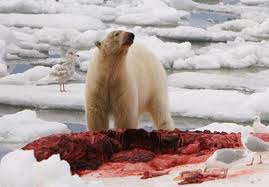Climate change is in the process of killing off an amazing array of species, perhaps humans among them. Another ramification of rising temperatures is the consolidation of species newly introduced to one another by the vanishing of habitats. It’s biodiversity disappearing into itself. The opening of “A Strange New Gene Pool of Animals Is Brewing in the Arctic,” Tim McDonnell’s Nautilus article about the rules of modern mating:
“The journey began in spring 2010, just as the sea ice surrounding the North Pole began its annual melt. Two bowhead whales, 50-foot-long behemoths that scour the Arctic seas for plankton, each started from their homes on opposite sides of North America—one in the Beaufort Sea north of Alaska, the other in Baffin Bay on the west side of Greenland. As the summer progressed, sea ice shrank (to its third-lowest cover in the last 30 years), and the whales swam toward each other through the now ice-free passage above the continent. Two independent teams of scientists from Canada and the United States watched the whales closely via satellite. ‘We were all pretty excited,’ recalls Kristen Laidre, a biologist at the University of Washington and member of the U.S. team.
In September, in an inlet some 1,800 miles north of Fargo, North Dakota, where the North American landmass dissolves into the Arctic Ocean, the whales met in the middle. They spent two weeks together, and although not much happened before they turned around, the meeting was historic. The fossil record indicates the last time Pacific and Atlantic bowhead whales came into contact was at least 10,000 years ago.
In the last 40 years, the Arctic has warmed by about 3.5 degrees Fahrenheit, more than twice the overall global rise in that same period. Already grizzly bears are tromping into polar bear territory while fish like cod and salmon are leaving their historic haunts to follow warming waters north. One tangible result of the migration, scientists report, is that animals will learn to live with new neighbors. But polar biologists worry that animals could get a little too friendly with each other. With less ice clogging Arctic seas, whales are ranging farther; meanwhile, animals like seals that breed on the ice have fewer places to go. In both cases, the chances of encountering a different species jump. ‘All of a sudden, hybridization will skyrocket,’ says Brendan Kelly, a polar ecologist at the National Science Foundation.”

